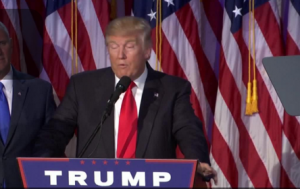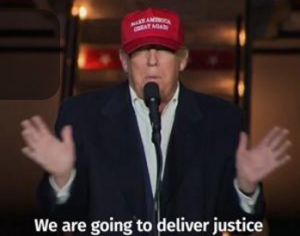What Donald Trump’s victory means for post-Brexit Britain
The Donald’s attitude to the US Federal Reserve is hostile. How this might pan out is anybody’s guess – but a threat to the stability of the dollar is now threatening to destabilise the entire world economy
The impact of Donald Trump’s remarkable victory on post-Brexit Britain is difficult to assess. Trump is, broadly speaking, a fan of Britain. After all, he chose Scotland as the location for his ambitious plan to create the finest golf course in the world, bar none.
When the Brexit result came through he hailed it as “a great victory”. Nigel Farage has the rare distinction of being a British politician invited to address a major rally for a mainstream presidential candidate (by mainstream I mean major party, of course). Trump’s advisors have let it be known that Britain would not be last in line for a trade deal with the United States.
So, as The Donald might ask, what’s not to like?
Well… Trump’s general attitude to free trade deals is hostile, and the irony may be that he hailed Brexit as a repudiation of free trade and freer movement of workers. The North American Free Trade Agreement, almost a quarter century old, which linked the American, Mexican and Canadian economies, is regarded by Trump as “the worst deal ever”. It is not immediately obvious that a UK-US deal, say one modelled closely on the current TTIP proposal, would actually be favoured by a Trump administration, if there was any adverse impact on American jobs.
Yet for a free trade agreement to work its economic magic, resources in each nation – people and capital – have to be allowed to move to more efficient uses. If not, then the free trade agreement will fail to deliver for any party.
We export north of £30bn worth of goods and services to the US, a little ahead of what we sell to Germany and about four times what the UK sends to China. It is a market that matters, however we get access to it.
Donald Trump does want to boost the economy, mainly through aggressive tax cuts. That may or may not work, and the economic evidence is contradictory, as some of Trump’s remarks sometimes are. On the whole, such is the scale of US national debt and underlying issues of competitiveness, it seems unlikely that President Trump will expand this vital market so massively in the short run.
It is something of an imitation of the “Reaganomics” of the 1980s (i.e. tax cuts and deregulation) which, arguably, landed the US with twin giant deficits in trade and the public finances. If it did work, Americans might have more cash in the pockets to spend on British Range Rovers, whisky and holidays “in England”, as they say.
Finally, there’s Trump’s attitude to the US Federal Reserve and its chair, Janet Yellen – again, hostile. How this now pans out is anybody’s guess, but a threat to the stability of the dollar could easily destabilise the entire world economy, and especially the financial system.
If global investors – especially the Chinese who have stashed away trillions of dollars’ worth of US government bonds – want to dump these because they think that President Trump is about to debauch the world’s reserve currency, the consequences would be grim indeed.
For more on this story and video go to: http://www.independent.co.uk/voices/donald-trump-president-wins-us-election-2016-brexit-britain-what-it-means-for-uk-a7395146.html








